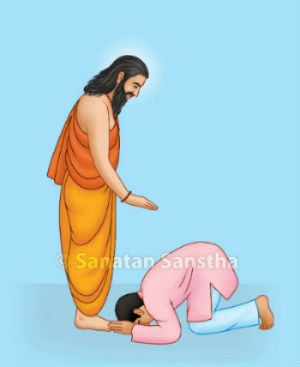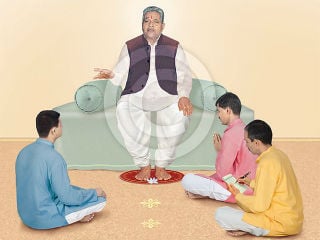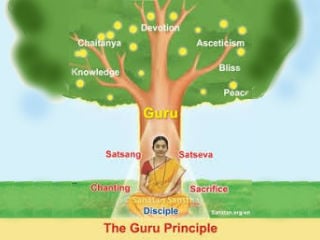Contents
2. Definition and meaning of disciple
3. The importance of discipleship
4. The student and the disciple
5. The medium and the disciple
6. The Guru-disciple relationship
1. Duty of a disciple !

Bowing at the Guru’s Holy feet is the duty of a disciple !
On the day of Gurupournima, a ring bestowed with the Tej of Guru (Principle) is created, which blesses the disciples. It is the duty of a disciple to bow at the Holy feet of the Guru on Gurupournima. Sanatan Sanstha is blessed by H.H. Bhaktaraj Maharaj. With the best of wishes I pray to God, ‘May Sanatan Sanstha, which is active for serving Dharma, get all the necessary strength to march ahead !’
– H.H. Ramanand Maharaj (Successor to Saint Bhaktaraj Maharaj, Indore, Madhya Pradesh)
Source : Monthly ‘Sanatan Prabhat’
2. Definition and meaning of disciple
A disciple is one who practises Spirituality as advised by the Guru, with the motive of making spiritual progress. The Kularnav Tantra defines a disciple as,
शरीरमर्थप्राणांश्च सद्गुरुभ्यो निवेद्य य: ।
गुरुभ्य: शिक्षते योगं शिष्य इत्यभिधीयते ।।
Meaning : The one who surrenders his everything, that is, his body, wealth and life unto the Guru and learns Yoga from Him (that is, practices Spirituality as recommended by Him) is called a disciple (shishya). Hence, even if a disciple deserts his wife and children and goes to his Guru he does not become a sinner.
3. The importance of discipleship
A. A disciple does not need to repay the four debts namely to God, sages, ancestors and the society.
B. गुरुपुत्रो वरं मूर्खस्तस्य सिध्दयन्ति नान्यथा ।
शुभकर्माणि सर्वाणि दीक्षाव्रततपांसि च ।। १५१ ।। – श्री गुरुगीता
Meaning : Although a disciple serving the Guru worthy of being called His son appears to be foolish in worldly interactions, yet his spiritual practice consisting of initiations, vowed religious observances and penance attains fulfillment. Those not serving the Guru thus do not acquire such benefits. – Shri Gurugita
गुरुपुत्र अपंडित । जरी मूर्ख तो सुनिश्चित ।
त्याचेनि सर्व कार्यसिध्दि होत । सिद्धान्त हा वेदवचनीं ।। १०२ ।। – श्री रंगनाथस्वामीकृत गुरुगीता
Meaning : The Guru’s son (means His disciple), while unlearned (apandit) and foolish (means the one who appears foolish) externally; though a disciple appears foolish externally, all the desires of those who visit him are fulfilled because of his spiritual powers. This is a doctrine from the Vedas.- Shri Gurugita by Shri Ranganathswami
4. The student and the disciple
Just as a Guru and a teacher can be differentiated, so also a disciple and a student are different. A student completes the account with his teacher by paying his fees. However, since the Guru imparts knowledge pertaining tothe soul (atmadnyan) no matter how much one does for Him, it is still far too little. This is akin to one’s inability to repay one’s parents who have cared for one since childhood. The student means chatra. The word ‘chatra’ in Sanskrut is derived thus ‘छत्रं गुरोर्दोषाणामावरणं तच्छीलमस्येति ।’. Chatra is the one who is naturally endowed with the propensity to obscure the Guru’s (teacher’s) defects (shabdakalpadrum). As against this, the disciple never finds any defects in the Guru.
5. The medium and the disciple
Dr. Jayant Athavale
If a Guru gets His mission fulfilled through a disciple just like a subtle body which operates through some medium then I am not at all interested in Spirituality.
H.H. Bhaktaraj Maharaj (Baba)
When one acts as a medium one cannot make spiritual progress. One remains influenced by someone else. On the contrary, when a Guru gets His mission accomplished through a disciple, He increases the potential of that disciple, just like Shri Ramakrushna who first increased Vivekanand’s spiritual prowess and thereafter got His mission fulfilled through him.’
One of Baba’s disciples used to jot down everything that Baba taught from time to time. Baba would tell him, “This writing is of no use to you (since you can now learn non-verbally), but it will definitely benefit others.” Later, that disciple wrote a book on Spirituality which Baba liked. So Baba told him, “My Guru had blessed Me that I would write several books. I wrote only one book of devotional songs (bhajans). So now I am bestowing My Guru’s blessing unto you.” The disciple responded saying, “But I do not experience Bliss by writing books anymore.” (When one goes to the non-verbal level, regressing to the verbal level means loss of Bliss.) Baba then told him, “You will have to write books. It is your duty. Write small books on each topic. They should be easy to handle and affordable for the common man as well.”
In March 1987, just five months before meeting his Guru, in the introduction to the book on Spirituality the disciple had written, ‘I pray to The Almighty to grant me His grace to be able to write a separate book on each of the topics in this book, in modern scientific language’. This blessing was like a response to his prayer made much earlier.
Unaware of all this, people feel, ‘What an in-depth study this disciple has done ! He has written such useful books’. They do not know that the Guru Himself has got this done through the disciple.
6. The Guru-disciple relationship
A. The Guru-disciple relationship is considered very sacred. It is the only true relationship. The Guru-disciple relationship is only spiritual in nature. The only awareness that a disciple should foster is that, ‘I should be uplifted spiritually’. The Guru too harbours only one feeling, ‘May this disciple be uplifted’. This relationship is independent of age. It is based on maturity of spiritual knowledge (dnyan) and spiritual practice (sadhana). All living organisms progress only through spiritual knowledge and spiritual practice. All other relationships are born out of fear or social commitments. Hence, they are bound by worldly restrictions. In these relationships, the ego constantly manifests itself and spiritual knowledge and the practice of Spirituality have no value. In other words, maintaining the ego helps to preserve these relationships. Thus, all relationships in which the ego is retained are albeit false.
B. Awareness of the Guru and disciple relation is an inferior sign.
‘Narayan manifests in all living beings, hence the other is akin to oneself. One harbours fear perceiving the rope to be a snake. Tuka says one should not pay attention to either qualities or defects.’
The explanation : Tukaram Maharaj says, “If everything is Brahman or Narayan then what is the need for Guru and discipleship? If everything is Brahman then is the disciple distinct from Him? If one does not realise that a rope lying in a place is a rope and perceives it as a snake then one will surely tremble in panic, at its sight!”
The sect of one disciple having one Guru which has become popular, aims at understanding the means to realise Me. – Shri Bhavarthadipika (Shri Dnyaneshvari) 18:1226
One thinks that the Guru and disciple relationship is a causative factor in a disciple’s progress. This illusion is true only till the moment the disciple receives initiation (anugraha) from his Guru. When a disciple who is endowed with the Guru’s initiation asks the Guru, “After how long will I be liberated?” the latter replies, “You are liberated the moment you are initiated. If you disbelieve Me then undertake the practice of devotion (do spiritual practice) in order to obtain that spiritual experience. However, if you have faith then even devotion (spiritual practice) is not required.”
No sooner is one initiated than one achieves the Final Liberation, the soul is freed from bondages. – Shri Dasbodh 8.7.59
Once the disciple attains the state of Absoluteness (Pûrnatva) the Guru-disciple relationship persists only in worldly terms for the sake of the people.’ – H.H. Kane Maharaj, Narayangaon

 The one and only Guru-disciple tradition of the Sanatan Sanstha which has proven special in...
The one and only Guru-disciple tradition of the Sanatan Sanstha which has proven special in... Who is proclaimed a Saint as per Science of Spirituality ?
Who is proclaimed a Saint as per Science of Spirituality ? Faith & Guru
Faith & Guru Who is a real Guru ?
Who is a real Guru ? The Guru Principle
The Guru Principle Offering gratitude unto the Holy feet of the Guru is true Gurudakshina !
Offering gratitude unto the Holy feet of the Guru is true Gurudakshina !